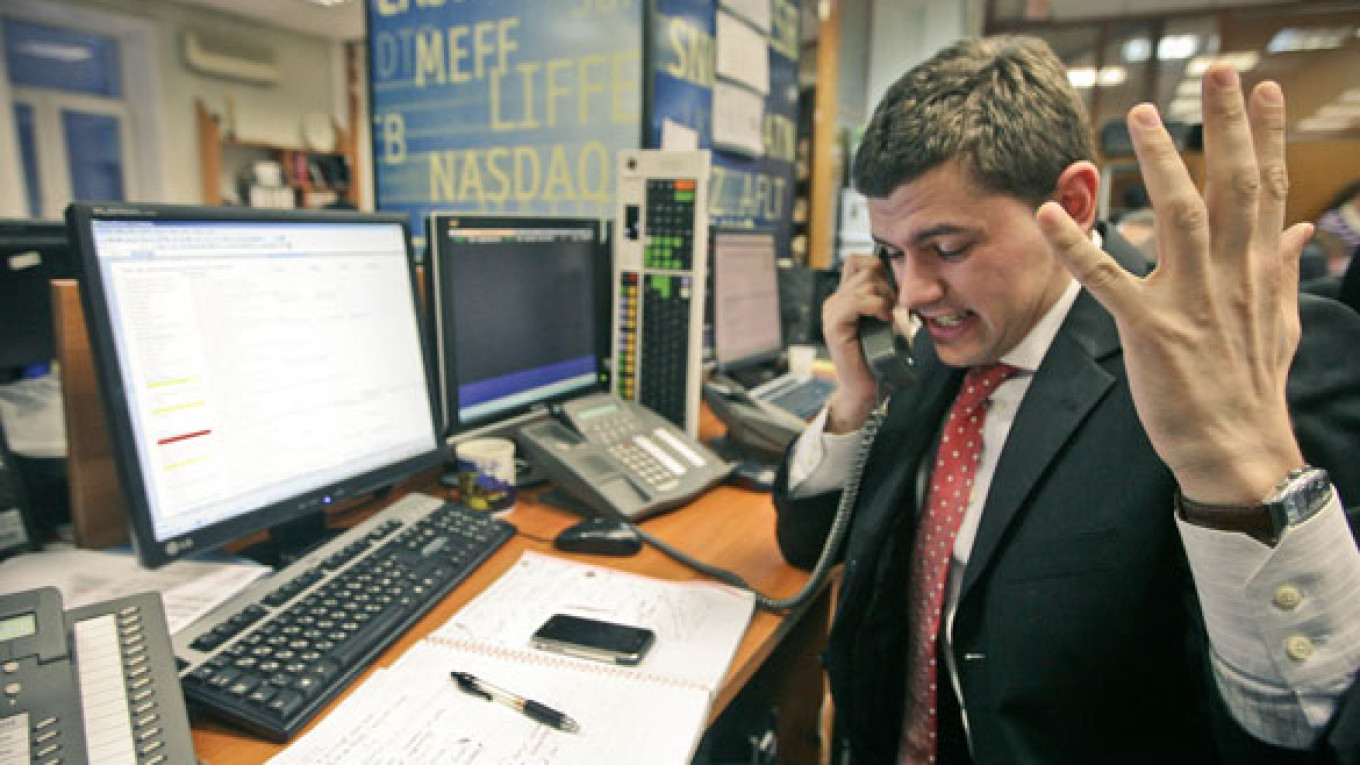Russian stocks plunged nearly 6 percent on Tuesday to levels not seen since October as investors sought to unload risky assets amid fears that the euro zone's escalating debt crisis could crimp the global economic recovery.
Damage was done across European markets — following an Asian sell-off over reports that North Korea is preparing for war — but analysts said Russia was particularly hard hit after moves by the state to crack down on pricing by metals companies, including steel giant Evraz Group.
The ruble-denominated MICEX Index closed down 5.7 percent at 1,197.4, putting it 21.8 percent below an April 15 high of 1530.9. The drop meant that the benchmark joined its dollar-denominated peer, the RTS Index, which fell into a bear market last week.
The RTS shed 6.5 percent in Tuesday's main session, falling to 1226.6.
"Investors fear that the debt crisis may lead to a 'double dip' scenario, and Russia is one of the most exposed economies in that scenario since it is so dependant on external exports due to lack of success in diversifying its economy," said Chris Weafer, chief strategist at UralSib.
To make matters worse, he said, "investors were spooked" by an announcement Monday that the Federal Anti-Monopoly Service was investigating pricing at Evraz, whose owners include billionaires Roman Abramovich and Alexander Abramov.
The company's London-traded Global Depositary Receipts sunk 8.2 percent, adding to Monday's losses of nearly 5 percent.
The pricing probe is an illustration of the government's "muscle flexing" in situations where it needs to help metal-dependent industries but cannot afford to subsidize pricier raw materials, said Alexander Osin, chief economist at Finam.
Other big losers Tuesday included Sberbank, which fell 8.2 percent, and Novolipetsk Steel, whose shares plummeted 9.6 percent. State-run energy giants Gazprom and Rosneft posted declines of 5.4 percent and 6 percent, respectively.
Of the MICEX Index's 30 stocks, only Polyus Gold managed a gain, rising 0.7 percent.
While banks and metals and mining stocks are most vulnerable, "defensive stocks include those subject to industry restructuring, like electricity and fixed-line telecoms, and those benefiting from economic revival, such as retail and transportation," Weafer said.
"Forget oil and gas. The sector was under pressure for some time and is in the backdrop now."
Prices for crude have fallen along with confidence in the world economic recovery, dropping to below $69 per barrel Tuesday. A surge in oil in the first quarter had helped Russian stocks and eased budget concerns for Russia.
Finance Minister Alexei Kudrin told reporters Tuesday that the government might base its budget for 2011-13 on an oil price of $70 per barrel, suggesting that the country's main export could find long-term support in the $70-to-$80 range that Prime Minister Vladimir Putin recently called "comfortable" for the Russian economy.
Kudrin called the debt crisis a "signal" to Europe to "consolidate its finances and strengthen the euro's position," although he also said he was "confident in the future of the euro."
The latest blow to the currency came Tuesday as the German Finance Ministry published a document saying it intended to introduce a "ban on naked short selling of shares, including derivatives," Reuters reported. A government source told the news agency that the limitations would apply to all German shares.
A similar move last week to combat negative bets against European banks and sovereign debt sent investors scrambling to safer assets, seriously weakening the euro.
"Fears of the debt crisis in Europe is a slogan that masks investors' attempt to cut losses as market risks grow," Finam's Osin said, citing widening spreads between low-rated securities and high-rated securities, as well as surging indicators of market volatility.
"There will be further decline [in stock prices], though some correction is possible," he said.
Solving the European debt problem would not necessarily change anything, since the market was already stagnating and banks have not been crediting the real economy, Osin added.
The ruble, which tracks a basket of dollars and euros, continued to weaken, tumbling 1.9 percent to 31.63 per dollar at the close of official trade Tuesday, its lowest level since September.
The currency closely depends on global trends and is likely to stay volatile in the coming weeks, Weafer said. "If Russia were a case in isolation, the ruble would be closer to 28, but in its dependence on external events, it will more likely go closer to 30, not above 31 over the next two weeks," he said.
Although much of the stock price woes came on headlines from Western Europe and Asia, analysts said the Russian market was unlikely to recoup its losses soon.
"Everybody is nervous, and most investors are standing back," Weafer said. "And they're most likely to continue standing back all summer."
A Message from The Moscow Times:
Dear readers,
We are facing unprecedented challenges. Russia's Prosecutor General's Office has designated The Moscow Times as an "undesirable" organization, criminalizing our work and putting our staff at risk of prosecution. This follows our earlier unjust labeling as a "foreign agent."
These actions are direct attempts to silence independent journalism in Russia. The authorities claim our work "discredits the decisions of the Russian leadership." We see things differently: we strive to provide accurate, unbiased reporting on Russia.
We, the journalists of The Moscow Times, refuse to be silenced. But to continue our work, we need your help.
Your support, no matter how small, makes a world of difference. If you can, please support us monthly starting from just $2. It's quick to set up, and every contribution makes a significant impact.
By supporting The Moscow Times, you're defending open, independent journalism in the face of repression. Thank you for standing with us.
Remind me later.


